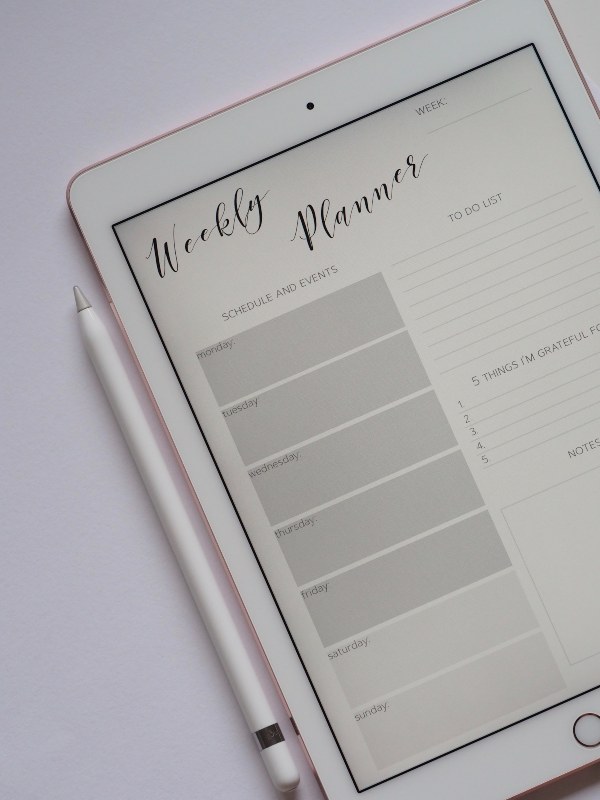Top Tips to Plan your Week

Need a few tips to help plan your week so you are more productive?
Are you guilty of sitting down at your desk to work and don’t know what you should be working on? Is your To-Do list just getting bigger and your struggle to get a system of knowing what should come first?
With a bit of forward thinking and planning, your week can run smoother. You can be in control of saying “no” to the work you cannot do or don’t have time for, you can avoid going down the rabbit hole of the world wide web in procrastination, and best of all, you can keep making forward progress.
Here are the top tips to plan your week in a more productive way.
Why do we need to plan?
If we don’t plan our days and weeks, we jump from task to task without any real direction or focus.
This results in feeling overwhelmed, stressed and flustered!
To help our success and to stay on task and reach our goals, planning is a must!
Failing to plan is planning to fail.
Allen Lakedin

Set your priorities
I suggest doing this at the end of the previous week on a Friday. Many people do this on a Sunday afternoon/evening, but for me, that is still my relaxation and leisure time, and I like to not have work on my mind at that hour, so I have what I call a CEO date on a Friday afternoon. But finding a time slot you can stick to is the main thing.
Work out what your “must do’s” for the week are?
Review where you are in the progress of your bigger goal/milestone. Work out what your next best step is, and that may be your main goal or goals are for the next week if that timing is right.
I suggest putting a maximum of 3 goals on your “must-do” for the week.

Schedule your priority tasks into your calendar
Once you work out what your main goals are for the week, schedule into your calendar the tasks you need to do to reach those goals.
An example of this might be a goal to create a new lead magnet. And the tasks needed to do that are things like, creating a freebie in Canva, and creating the automation in Mailerlite.
Also, schedule any meetings or training you have that week.

Eat that Frog
If you have ever read Brian Tracey’s book Eat that Frog, you would be familiar with doing your biggest hardest & most important task first.
He relates those tasks to eating a live frog, suggesting “If you have to eat a live frog at all, it doesn’t pay to sit and look at it for very long” In other words, attend to your major task first thing each morning, and don’t waste time putting it off thinking about it.
With that in mind, schedule the important tasks in priority order at the beginning of your days each week.

Anticipate any time slots you know won’t work
Anticipating time slots that won’t work include things, like "personal" time where you know you have a child awake, or too many people at home that you know the distractions would be too great.
It also might be when you know there are domestic duties you need to tend to at that time, like cooking dinner for the family.

Blocking time – focus time
If you know you work best at a certain time of day and for a certain length of time, it is helpful to block this out in your schedule in those time blocks.
An example might be you know you can focus well for 30 minutes at a time, but often start wandering in mind and body after that. Schedule in your focus time blocks for the various tasks in 30-minute chunks with a 5-minute break to reset. You might have 4 of these, and then have a longer break to refuel the body and mind.

Non-negotiables
Schedule into your week your “non-negotiables” so you don’t put work ahead of the important things to yourself and your family.
These might be things such as your daily exercise, school pick-ups, or reading for pleasure.
It is scheduling these things into our weekly schedule that allow us to have our work-life balance on our terms, and to continue to fill up our own cups.

Rabbit Hole Time
Schedule time for going down the rabbit hole – mindless scrolling of social media. Yes, you read that right. We know it will happen to most people at some point in our day. Instead of using this when you are procrastinating and avoiding doing other tasks, schedule this into your days.

How does this help?
You know it’s going to happen, so why not plan for it instead of resorting to using it to avoid other tasks. If you know you have an approved slot to do it, there is less guilt around wasting time, and you are more likely to not use that avoidance at other stages of the day.
Meal plan
Plan your meals ahead of time to take the thought and worry out of what you need to cook that night. Nights you may be working later, or home later, you can organise a dinner that requires little prep or cooking time.
It’s also much easier for someone else to also help you with meals if there is a plan and they know what’s also on the menu.
And another winner is you can save money at the checkout as you are not just buying random groceries, or buying them too often, you are shopping for what you need.

Hope these top tips help you run your week, not your week run you.
If you take a little time out to plan, then you will save yourself time in lost productivity.
If you like these tips and you want to see more, sign up for my weekly newsletter
Need a little to work through a block and get a plan in place?
Grab one of my Free Quickfire Planning Sessions. This is my free 30 minute session to help you get a plan and know your next step you need to take!
Want to improve your productivity and simplify your systems?
Sign up to get my latest tips and updates!
And join the VIP list to be the first to know about new releases, discounts & promos before anyone else!
(I hate SPAM and will not overload your already busy inbox)


